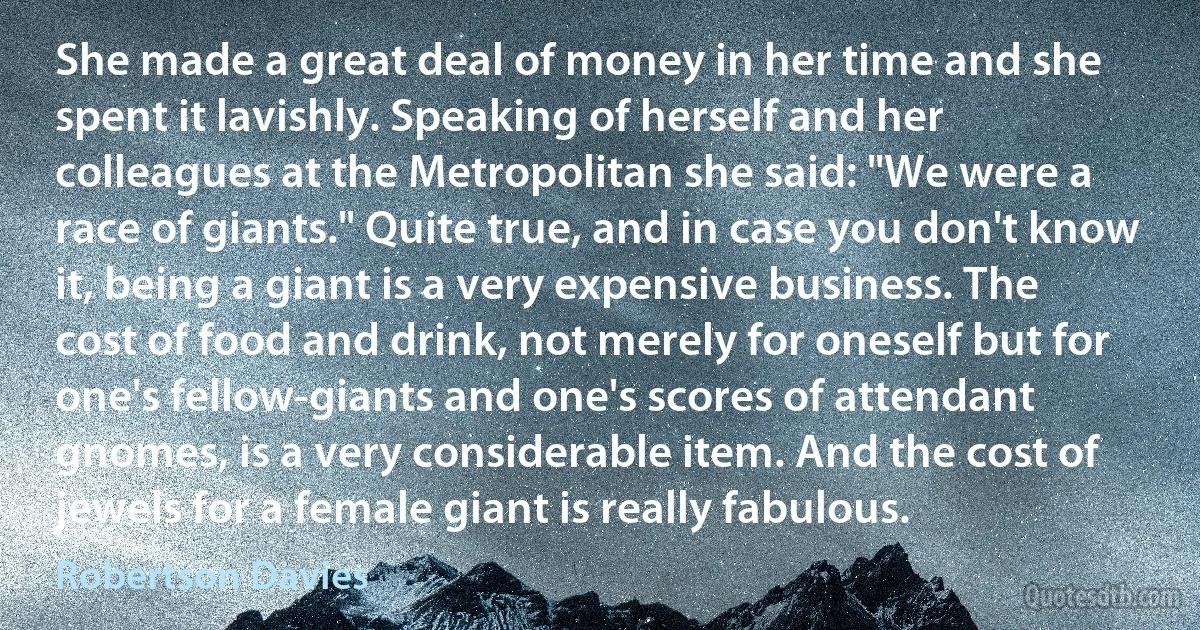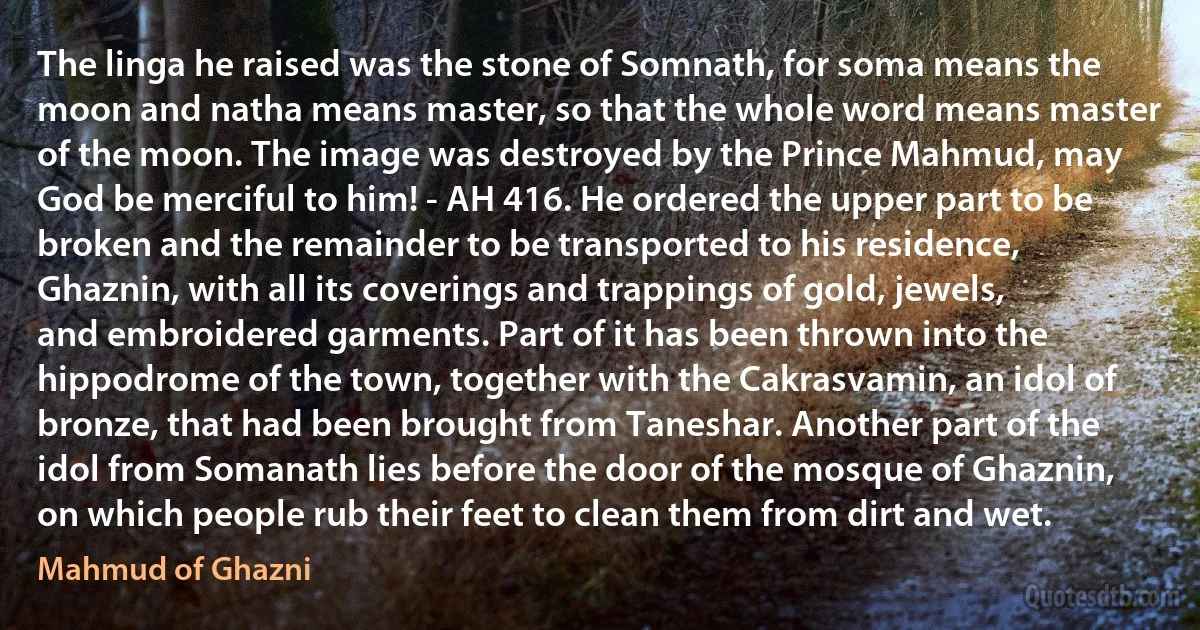Jewels Quotes - page 3
The Jew is uncreative. He produces nothing, he only haggles with products. With rags, clothing, pictures, jewels, grain, stocks, cures, peoples and states. He has somehow stolen everything he deals in. When he attacks a state he is a revolutionary. As soon as he holds power, he preaches peace and order so that he can devour his conquests in comfort.

Joseph Goebbels
If all the sky was made of gold leaf, and the air was starred with fine silver, and treasure borne on all the winds, and every drop of sea-water was a florin, and it rained down, morning and evening, riches, goods, honours, jewels, money, till all the people were filled with it, and I stood there naked in such rain and wind, never a drop of it would fall on me.

Eustache Deschamps
Among the thirteenth-century windows the Western Rose alone seems to affect a rivalry in brilliance with the lancets, and carries it so far that the separate medallions and pictures are quite lost,- especially in direct sunshine,- blending in a confused effect of opals, in a delirium of color and light, with a result like a cluster of stones in jewelry. Assuming as one must, in want of the artist's instruction, that he knew what he wanted to do, and did it, one must take for granted that he treated the Rose as a whole, and aimed at giving it harmony with the three precious windows beneath. The effect is that of a single large ornament; a round breastpin, or what is now called a sun-burst, of jewels, with three large pendants beneath.

Henry Adams
25 May 1679: ‘Khan-i-Jahan Bahadur returned from Jodhpur after demolishing its temples, and bringing with himself several cart-loads of idols. The Emperor ordered that the idols, which were mostly of gold, silver, brass, copper or stone and adorned with jewels, should be cast in the quadrangle of the Court and under the steps of the Jama Mosque for being trodden upon.'

Aurangzeb
In that privileged place, reality and the sublime dimension almost come together. My mystical paradise begins in the plains of the Empordà, is surrounded by the Alberes hills, and reaches plenitude in the bay of Cadaqués. This land is my permanent inspiration. The only place in the world, too, where I feel loved. When I painted that rock that I entitled 'The Great Masturbator', I did nothing more than render homage to one of the promontories of my kingdom, and my painting was a hymn to one of the jewels of my crown.

Salvador Dalí
Always have a book at hand, in the parlor, on the table, for the family; a book of condensed thought and striking anecdote, of sound maxims and truthful apothegms. It will impress on your own mind a thousand valuable suggestions, and teach your children a thousand lessons of truth and duty. Such a book is a casket of jewels for your housebold.

Tryon Edwards
Let a man be of good cheer about his soul, who has cast away the pleasures and ornaments of the body as alien to him, and rather hurtful in their effects, and has followed after the pleasures of knowledge in this life; who has adorned the soul in her own proper jewels, which are temperance, and justice, and courage, and nobility, and truth-in these arrayed she is ready to go on her journey to the world below, when her time comes. You, Simmias and Cebes, and all other men, will depart at some time or other. Me already, as the tragic poet would say, the voice of fate calls.

Socrates
When a man comes not merely to tolerate, but to boast of the stains that the world has flung upon him; when he wears his spots as if they were jewels; when he flaunts his unscrupulousness, and his cynicism and his disbelief and his hard-heartedness in your face as the signs and badges of his superiority; when to be innocent and unsuspicious and sensitive seems to be ridiculous and weak; when it is reputable to show that we are men of the world by exhibiting the stains that the world has left upon our reputation, our conduct, and our heart, then we understand how flagrant is the danger; then we see how hard it must be to keep ourselves unspotted from the world.

Phillips Brooks
She [Lee's mother] was muddled and mischievous as a chimney-jackdaw, she made her nest of rags and jewels, was happy in the sunlight, squawked loudly at danger, pried and was insatiably curious, forgot when to eat or ate all day, and sang when sunsets were red. She lived the easy laws of the hedgerow, loved the world and made no plans, had a quick holy eye for natural wonders and couldn't have kept a neat house for her life.

Laurie Lee
There was another rai in those parts, whose rule extended over sea and land, a Brahmin named Pandya Guru. He had many cities in his possession, and his capital was Fatan, where there was a temple with an idol in it laden with jewels... The rai, when the army of the Sultan arrived at Fatan, fled away, and what can an army do without its leader? The Musalmans in his service sought protection from the king's army, and they were made happy with the kind of reception they met. 500 elephants were taken. They then struck the idol with an iron hatchet, and opened its head. Although it was the very Kibla of the accursed gabrs, it kissed the earth and filled the holy treasury.

Amir Khusrow
Muhammad Kasim then entered and all the town people came to the temple of Nobhar, and prostrated themselves before an idol. Muhammad Kasim enquired: 'Whose house is this, in which all the people high and low are respectfully kneeling and bowing down.' They replied: 'This is an idol-house called Nobhar.' Then, by Muhammad Kasim's order, the temple was opened. Entering it with his officers he saw an equestrian statue. The body of the idol was made of marble or alabaster, and it had on its arms golden bracelets, set with jewels and rubies. Muhammad Kasim stretched his hand and took off a bracelet from one of the idol's arms. Then he asked the keeper of the Budh temple Nobhar: 'Is this your idol?' 'Yes,' he replied, 'but it had two bracelets on, and one is missing.' 'Well' said Muhammad Kasim, 'cannot your god know who has taken away his bracelet?

Muhammad bin Qasim
This is not a book about charismatic visionary leaders. It is not about visionary product concepts or visionary market insights. Nor even is it about having a corporate vision. This is a book about something far more important, enduring, and substantial. This is a book about visionary companies. What is a visionary company? Visionary companies are premier institutions -- the crown jewels -- in their industries, widely admired by their peers and having a long track record of making a significant impact on the world around them. The key point is that a visionary company is an organization -- an institution. All individual leaders, no matter how charismatic or visionary, eventually die; and all visionary products and services -- all "great ideas" -- eventually become obsolete. Indeed, entire markets can become obsolete and disappear. Yet visionary companies prosper over long periods of time, through multiple product life cycles and multiple generations of active leaders.

James C. Collins
In the year AH 710 (AD 1310), the King again sent Mullik Kafoor and Khwaja Hajy with a great army, to reduce Dwara Sumoodra and Maabir in the Deccan, where he heard there were temples very rich in gold and jewels' They found in the temple prodigious spoils, such as idols of gold, adorned with precious stones, and other rich effects, consecrated to Hindoo worship. On the sea-coast the conqueror built a small mosque, and ordered prayers to be read according to the Mahomedan faith, and the Khootba to be pronounced in the name of Allaood-Deen Khiljy. This mosque remains entire in our days at Sett Bund Rameswur, for the infidels, esteeming it a house consecrated to God, would not destroy it.

Alauddin Khalji
![[Description of Britain] Its plains are spacious, its hills are pleasantly situated, adapted for superior tillage, and its mountains are admirably calculated for the alternate pasturage of cattle, where flowers of various colours, trodden by the feet of man, give it the appearance of a lovely picture. It is decked, like a man's chosen bride, with divers jewels, with lucid fountains and abundant brooks wandering over the snow white sands; with transparent rivers, flowing in gentle murmurs, and offering a sweet pledge of slumber to those who recline upon their banks, whilst it is irrigated by abundant lakes, which pour forth cool torrents of refreshing water. (Gildas)](https://cdn.quotesdtb.com/img/quotes_images_webp/18/gildas-alternate-appearance-bride-425518.webp)


